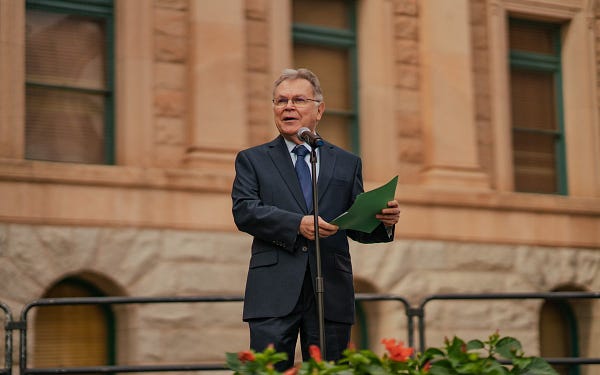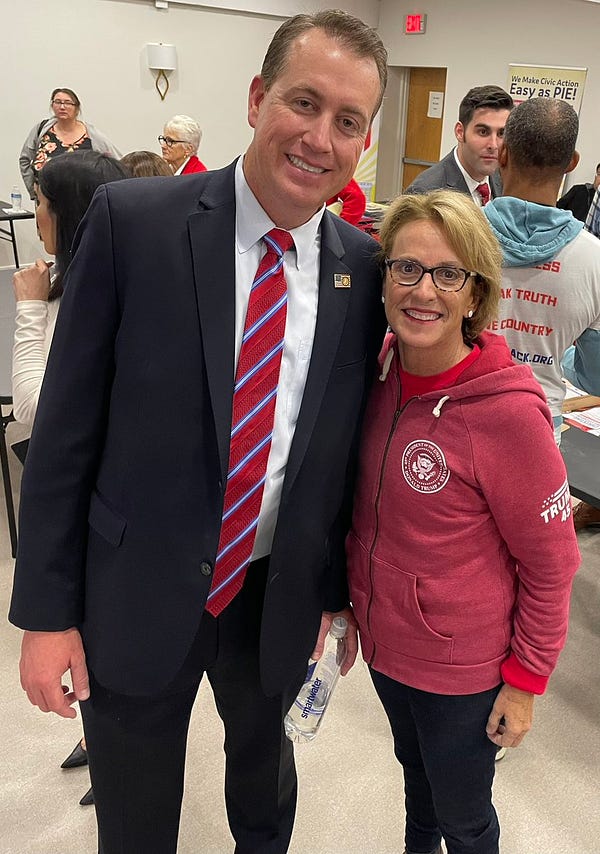The Daily Agenda: The opening salvos
Maybe we’ll leak budget docs to him … Don Bolles bills on the move … And it’s better to lose twice than never to have run at all.
When the elevator doors swung open on the first floor of the Executive Tower Friday, a gaggle of reporters, fresh out of the governor’s budget briefing on the eighth floor, found Sen. John Kavanagh waiting for his own gubernatorial briefing.
The reporters peppered the longtime GOP legislative budget leader with questions about Gov. Katie Hobbs’ $17.1 billion spending plan, but Kavanagh didn’t have any witty remarks prepared for the occasion. For the first time in more than a decade, GOP legislative leaders were the last to know the details of the governor’s budget.
But Kavanagh and other GOP leaders didn’t need to see the proposal to intuit that they wouldn’t like it. On Thursday, the day before Hobbs released her own plan, Republicans at the Capitol floated their own budget proposal: No new spending.

Hobbs’ budget proposal offers a sharp rebuke of her predecessor’s priorities. Like former Gov. Doug Ducey, Hobbs has a few targeted tax cuts in mind, as well as another huge deposit into the state’s rainy day fund. But the problems lie in almost everything else she proposed.
Among legislative Republicans’ most-hated priorities are canceling the state’s new universal school voucher program, disbanding the Department of Public Safety’s Border Strike Force and nixing “results-based funding” to high-performing schools, all staples of Ducey’s administration.
Ending those programs and policies are nonstarters with the Republican Legislature, just as contemplating a budget with no new spending is a nonstarter with Hobbs.
You can click here for a deep dive into Hobbs’ budget proposal for the fiscal year starting in July, but here’s a breakdown of the major highlights:
The $17 billion proposal includes about $1.3 billion of new spending.
One of the largest chunks of spending is a $250 million deposit into the state’s rainy day fund, bringing it to a record $1.6 billion.
Education would eat up another $275 million of new spending, including $200 million in additional base support for all schools, almost $11 million in additional assistance and $20 million for dual enrollment programs.
School infrastructure would also see a massive boost of $350 million for one-time building renewal projects.
Higher education would see a roughly $170 million increase, including $80 million for scholarships for students and Dreamers, as well as $14 million for rural community colleges and $15 million to expand the Arizona Teachers Academy.
The budget would allocate an additional $150 million to the Housing Trust Fund for utility and rental assistance, repair grants for seniors and legal aid for families facing eviction.
The Arizona Health Cost Containment System and the Departments of Child Safety and Economic Services would see boosts to keep up with caseload growth.
State employees would see a pay increase from a $200 million allocation to the Department of Administration, as well as another $54 million for targeted pay raises.
Hobbs’ budget also contains about $250 million for infrastructure upgrades and other needs in the Department of Corrections.
The budget would repeal universal voucher legislation, creating a savings of $135 million next year.
The proposal sets aside $90 million for tax cuts, including by cutting sales taxes on diapers and feminine hygiene products, as well as a new state child tax credit.
Republican lawmakers met Hobbs’ opening offer with a plan to once again pass a budget that only spends the bare minimum required under law to keep up with mandated spending formulas. Only after that budget is secured, they argued, will they negotiate with Hobbs on additional priorities.
That counter-proposal, of course, is a trick. Once we have a baseline spending plan in place, Republican lawmakers will have no motivation to add additional spending onto that plan.
But by the same token, Hobbs’ budget shouldn’t be taken at face value. She threw in poison pills, like rolling back school vouchers, to appease her base and give lawmakers a focal point to hate. Once those ideas are nixed, the proposal will seem tame to some Republican lawmakers.
The chasm between what legislative Republicans want and what the Democratic governor wants is huge, but the difference is not insurmountable. The two sides have less than six months to find a middle ground between the Democratic draft Hobbs offered and the bare-bones bid that Republicans are proposing.
There is a middle ground to be found. But it’ll require enough Republicans and Democrats being willing to work together to find it.
More like Rio Vacio: Rio Verde, a wealthy suburb of Scottsdale, became little more than a campground overnight after Scottsdale turned off the tap for water this month in an attempt to save water for its own residents, Jack Healy writes in the New York Times. The Rio Verde mess is so hot that the Washington Post’s Joshua Partlow also dives into the waterless city. Meanwhile, in the Republic, Sasha Hupka and Sam Kmack detail the lawsuit Rio Verde residents filed against Scottsdale seeking to get the spouts turned back on and a new bill from Republican Rep. David Cook that would force Scottsdale to cut off water to its city council members and mayor if it keeps the water off for Rio Verde.
“It’s a cautionary tale for home buyers,” Sarah Porter, director of the Kyl Center for Water Policy at Arizona State University, told Healy. “We can’t just protect every single person who buys a parcel and builds a home. There isn’t enough money or water.”
So much leftovers: The Hobbs administration forked over records to reporter Howie Fischer showing who paid how much for her inauguration bash. A committee raised about $1.5 million for her inauguration, including $250,000 from Arizona Public Service, but only spent about $200,000 of that. The remainder can be spent on future political campaigns.


Faster might be better: Maricopa County Recorder Stephen Richer drafted a 28-page policy paper detailing proposed fixes to Arizona’s elections and spoke to KTAR about his ideas, including options to deal with “late early ballots” slowing down the count — either by banning early ballot drop-offs at the last minute, requiring check-ins to drop off early ballots, or letting elections officials tabulate late incoming early ballots up until the day of the election. He also calls for consolidating election administration responsibilities and offers proposals to beef up campaign finance reporting compliance and investigations. Already, fringe Republican lawmakers are filing legislation to ban early voting and require all ballots be counted by hand.
“If you wanna be able to call these close election contests within 48 hours, then you gotta make early ballots early,” Richer told KTAR.
New chair, who dis?: Maricopa County Republicans met this weekend to select new leadership, picking their new county party chair Craig Berland, who had Kari Lake’s endorsement. Meanwhile, the state party chair races are heating up. U.S. Sen. Mark Kelly and his wife, former U.S. Rep. Gabby Giffords, are backing Yolanda Bejarano as the next Arizona Democratic Party chair, setting up a fight with Gov. Katie Hobbs, who is backing former lawmaker turned Maricopa County Supervisor Steve Gallardo for the job. And former state Treasurer Jeff DeWit is gaining steam on the Republican side.



New governor, who dis?: Republican lawmakers’ first priority of the year is to again slash income taxes, though the sponsor of the legislation that is getting fast-tracked through the Legislature, Sen. David Livingston, acknowledges the bill is going to need some work if it’s going to stand a chance of getting the Democratic governor’s signature, the Republic’s Mary Jo Pitzl reports.
Recall them all: Locals upset with Cochise County Supervisor Tom Crosby’s refusal to sign off on the county election results are organizing a recall campaign against him. They need at least 4,865 valid signatures from registered voters in his district within 120 days to force the question to a vote, Arizona Public Media’s Summer Hom notes.
The Mendez vacancy rule: After considering a Senate rule change to punish Democratic Sen. Juan Mendez for not showing up to work in person last year, Republican Sen. T.J. Shope is now considering legislation to declare an office vacant if lawmakers don’t show up for three consecutive months, the Arizona Capitol Times’ Camryn Sanchez writes. Mendez and his wife, Democratic Rep. Athena Salman, said they would return to the Capitol this year, but Mendez tested positive for COVID-19 just before the session started, while Salman tested positive after showing up for opening day. Separately, Sanchez writes that it’s not entirely clear who’s in the Arizona Legislature’s new “freedom caucus.”
Haves and have-nots: Freshman Republican U.S. Rep. Eli Crane is worried he might “wind up in the broom closet” after rebuking House Speaker Kevin McCarthy in 14 of 14 votes, he tells the New York Times. While he didn’t make voting against McCarthy a campaign promise, Crane said he felt he owed it to his voters and fellow holdouts to keep voting no until the bitter end. Arizona’s other Freshman Republican congressman, Juan Ciscomani, supported McCarthy and landed on the all-powerful Appropriations Committee, the only freshman on the panel, the Green Valley News notes. Ciscomani also spoke to Arizona Public Media about his first week in office.
"The moment that it hits you is when the clerk says, 'for what purpose does the gentleman from Arizona rise?' and you're like, 'that's me. I'm the gentleman from Arizona,'" Ciscomani said.
Meanwhile in Davos: U.S. Sen. Kyrsten Sinema was among the lawmakers who dined with billionaires and business leaders at a “private ritzy lunch atop the World Economic Forum” Monday, CNBC notes.


Legalize it and they won’t come: Law enforcement officials haven’t found a new drug smuggling tunnel in Nogales, Arizona, once named the Tunnel Capital of the United States, since 2020, the Nogales International’s Jonathan Clark writes. While law enforcement says that’s because of closer collaboration with Mexican authorities, Clark notes there’s another good reason tunnel construction may be slowing down: Arizona legalized recreational marijuana in 2020.
Mazel tov: Democratic U.S. Rep. Ruben Gallego is expecting a baby girl with his wife, Sydney, the Republic’s Tara Kavaler writes. His son Michael, from his previous marriage to Phoenix Mayor Kate Gallego, is pretty stoked.
Help us help Don Bolles: Our bill to honor murdered journalist Don Bolles with a monument at the state Capitol has a twin! Democratic Rep. Jennifer Longdon filed HB2171, a mirror bill to Republican Sen. T.J. Shope’s SB1039, last week. The Senate bill has been assigned to the Government Committee, while the House bill has yet to be assigned. You can help these bills get out of committee by writing a quick email to Senate Government Chair Jake Hoffman politely telling him why you like the idea and asking him to put it on the agenda. And please register your support on the Capitol’s Request to Speak system. If you don’t already have an account and can’t make it down to the Capitol to create one, the nice people at Civic Engagement Beyond Voting will set one up for you.
Keep reading with a 7-day free trial
Subscribe to Arizona Agenda to keep reading this post and get 7 days of free access to the full post archives.




